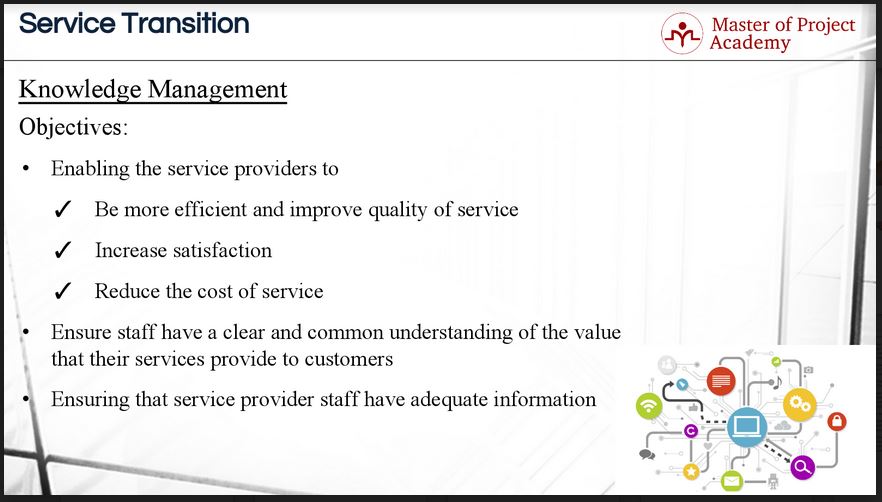The knowledge management process is the last process of the ITIL Service Transition stage of the ITIL lifecycle as described in the ITIL online courses. The knowledge management process ensures that all staff members of an IT service provider have an accurate and sufficient knowledge to be able to contribute to the vision and mission of the IT service provider and to ensure that the services that they deliver to the customer add value. ITIL foundation exam will test your knowledge about goals and objectives of the knowledge management process, and this is what we will explain in this article.

The capability of a company is its knowledge and experience. Capabilities are not like resources. Resources are mostly related to the budget of a company while capabilities are earned based on experience and therefore cannot be purchased. Since knowledge is a valuable asset of a company, this must be kept in the company and available for the use of other employees as well. And this is ensured mainly by the knowledge management process.
The goal of the knowledge management process
The primary purpose of the knowledge management process is enabling organizations to improve the quality of management decision making by ensuring that reliable and secure information and data is available throughout the Service Lifecycle. Let’s consider that there is a best practice applied when fixing a bug in the software of an IT Service provider, or a faster procedure to handle a request in service delivery, or a workaround for a known problem until a persistent fix is provided. These are all important information, data, and knowledge that should be managed and used in case the IT service provider personnel need it. And these kinds of information and data is managed and controlled by the knowledge management process.
The objectives of the knowledge management process
Let’s look at the objectives of the knowledge management process. There are three main objectives of the knowledge management process that enable an IT service provider to:
- Be more efficient and improve quality of service
- Increase satisfaction
- Reduce the cost of service

Creating efficiency through streamlined procedures
A workaround for a known problem or a simpler way of doing something should be known by all employees of an IT Service provider. In this way, a workaround or faster way of delivering a service can be ensured. And this will enable efficient service delivery, improved service quality, increased customer satisfaction and a reduction in costs respectively. Therefore, the knowledge management process aims to distribute critical data and information for the use of the staff of an IT Service Provider.
Clear and shared understanding of value of services
Another objective of the knowledge management process is ensuring that the staff has a clear and common understanding of the value that their services provide to customers. Each employee must know the mission, vision and high-level strategies of a company. Each personnel member must keep the ultimate value of a service to its customers in mind when delivering a service. For instance, a telecom operator must be aiming to provide connectivity wherever a subscriber is. Or, a vendor can be aiming to provide seven days and twenty hours support for its each customer etc. These kinds of mission, vision, and strategy of a company and value that should be delivered to the customer must be known by the staff, and this is ensured by the knowledge management process.
Ensuring that the staff has adequate information
The final objective of the knowledge management process is ensuring that the IT service provider staff have adequate information. To provide successful service delivery to the customers, people as the resources of an IT service provider is crucial. Especially if the end service is provided by the staff to the customers, these staff members must be very well trained and have sufficient knowledge of what will be delivered to the customer and how to respond to the possible customer questions. Training and equipment of the staff with relevant information and skills are the objective of the knowledge management process.

Knowledge management systems
The Data-Information-Knowledge-Wisdom hierarchy forms part of the knowledge management system. This hierarchy explains how data is transformed from a chaotic mass of data into an understanding of relations (information), an understanding of patterns (knowledge) and an understanding of principles (wisdom). This is an efficient way of transforming data into useful and valuable units of information.
The service knowledge management system or SKMS also forms part of the knowledge management system. It is a set of tools and databases that are used to manage knowledge and information. All services, components, assets, documentations, applications, databases, etc. all constitute the service knowledge management system of an IT Service Provider.
The knowledge management process is the final process of the ITIL Service Transition stage of the ITIL service lifecycle. Knowledge is fluid and different people in an organization have knowledge of various aspects of a service. To ensure a secure chain of knowledge within an IT service provider, a clear process like the knowledge management process must be followed so that services can be rolled out and managed efficiently.
It’s important to ensure that knowledge is owned by the company and not just by the individual. Banks of knowledge is collected during the ITIL Service Strategy and Service Design stages that must be handed over to the ITIL Service Operation stage that all services run efficiently. This knowledge transfer process is part of the Service Transition Stage of the ITIL service lifecycle. It’s in this manner that the different stages of the ITIL lifecycle interact with one another.
Review by: Jack Kelly

2 thoughts on “The 3 Objectives of ITIL Knowledge Management Process Explained”
Comments are closed.